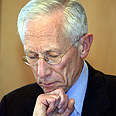
Fischer cuts interest rates by 0.25%
Bank of Israel lowers short-term borrowing costs by quarter-percentage point to new low of 0.5% in what analysts believe puts an end to a six-month rate cut cycle aimed at boosting economy
The Bank of Israel lowered short-term borrowing costs by a quarter-percentage point to a new low of 0.5% on Monday in what analysts believe puts an end to a six-month rate cut cycle aimed at boosting the economy.
With Israel's political environment in a state of chaos for months, the central bank has taken on the burden of trying to deal with the effects of a global economic slowdown.
Its latest rate reduction was the eighth since October 7, bringing total cuts to 3.75 percentage points. It comes as the economy shows more signs of recession.
"Data that became available during the last month point to an increase in the severity of the recession in global and domestic economic activity," the Bank of Israel said in a statement accompanying the rate cut.
"The effects of the global crisis are evident, among other things, in declines in exports and in domestic demand."
On the heels of downward revisions to global trade and economic growth, the Bank of Israel earlier this month cut its estimate to a contraction of up to 1.5% in 2009.
Economists were split as to whether Bank of Israel Governor Stanley Fischer would pull the trigger one more time since he had previously questioned the effectiveness of rates being so low. Such levels are hurting banks' ability to extend credit since customers are pulling money from deposit accounts to cash.
Other monetary tools to be used
"When weighing all considerations, he just wanted to give the economy one more push and it probably will be just one more push," said HSBC economist Jonathan Katz.
A Reuters poll from last week found that those predicting a rate cut believed it would be the last. Others thought the cycle had ended with last month's move.
Katz said one motivation for the rate reduction could have been a spike in the shekel
He and others believe Fischer will concentrate more on other monetary tools such as quantitative easing and expanding a plan announced last month to buy Israeli government bonds.
The Bank of Israel indicated it would continue to act in similar fashion to other central banks and use other monetary tools to lower long-term rates.
"Some central banks that had not yet reached zero levels of interest cut their rates further, and some of those that have reached zero levels are employing additional instruments aimed at easing credit for households and businesses," it said.
With short-term rates so low, the central bank last month started buying government bonds in the secondary market to push yields lower. Yields initially fell but they rose again before falling once more after the Federal Reserve said it would buy US Treasury bonds.
The Bank of Israel noted that inflation continued a downward trend in February, with inflation expectations the next 12 months below an official target of 1 to 3% a year, although commodity price declines have ended.
"The Bank of Israel will... use the instruments available to it to achieve its objectives of price stability, the encouragement of employment and growth, and support for the stability of the financial system," it said.










